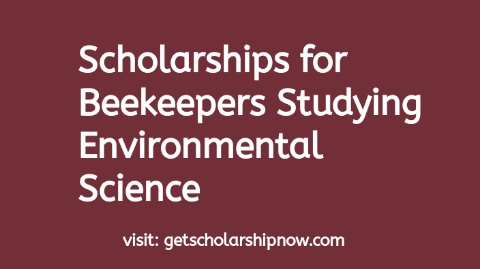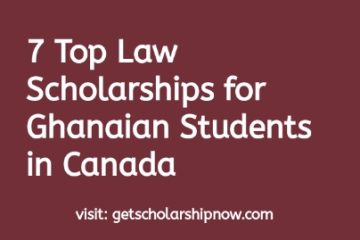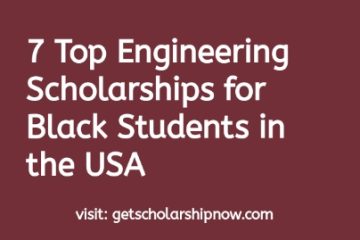If you’re a beekeeper with a passion for environmental science, you might be wondering how to fund your education without breaking the bank. Scholarships for beekeepers studying environmental science offer a perfect solution, providing financial support tailored to your unique interests. Whether you’re an aspiring apiarist aiming to protect pollinators or a student eager to tackle climate change through research, these opportunities can help you achieve your academic and professional goals.
In this comprehensive guide, we’ll explore scholarships specifically designed for beekeepers pursuing environmental science, offering detailed insights into eligibility, application processes, and funding amounts. With the global decline of bee populations—a critical issue tied to environmental health—these scholarships empower students to make a difference. Let’s dive into the opportunities awaiting you and how you can secure them.
Table of Contents
Why Scholarships for Beekeepers Studying Environmental Science Matter
Bees are vital to ecosystems and agriculture, pollinating over 70% of the world’s crops, according to the Food and Agriculture Organization (FAO). However, their populations are declining due to habitat loss, pesticides, and climate change—issues at the heart of environmental science. Beekeepers studying this field are uniquely positioned to address these challenges, combining hands-on apiculture experience with scientific expertise.
Scholarships in this niche area are more than just financial aid—they’re investments in the future of sustainability. They support students who bridge practical beekeeping with academic research, fostering solutions to environmental crises. Below, we’ll cover the top scholarships available, their benefits, and how to apply.
Top Scholarships for Beekeepers Studying Environmental Science
1. PAm-Costco Scholarship Program
The Project Apis m. (PAm)-Costco Scholarship is one of the most prestigious awards for students researching honey bee health, a critical component of environmental science. Funded by Costco Wholesale and administered by Project Apis m., this scholarship supports graduate students tackling pollinator challenges.
Eligibility
- Level: Ph.D. students (Master’s students may be considered in exceptional cases).
- Field: Research focused on honey bee health, which aligns with environmental science topics like pesticide impacts, habitat restoration, or climate resilience.
- Requirements: Must be enrolled in an accredited U.S. or Canadian institution, demonstrate a strong academic record, and submit a research proposal.
Award Details
- Amount: Up to $50,000 per year for Ph.D. students; $10,000 for Master’s students.
- Duration: Renewable for up to three years, based on progress.
- Use: Covers tuition, research expenses, and living costs.
Application Process
- Deadline: April 1, 2025 (applications close at midnight PDT).
- How to Apply: Submit an online application via the PAm-Costco Scholarship page, including a research proposal, CV, transcripts, and two letters of recommendation.
- Tips: Highlight your beekeeping experience and how your research addresses environmental issues like pollinator decline.
Real-World Impact
In 2024, recipient Emily Johnson used the scholarship to study the effects of neonicotinoids on bee colonies, presenting her findings at the American Beekeeping Federation conference. Her work influenced pesticide policy discussions, showcasing the scholarship’s real-world impact.
2. Eastern Apicultural Society (EAS) Master Beekeeper Scholarship
The EAS Master Beekeeper Scholarship encourages young beekeepers to deepen their expertise, offering funding to attend the annual EAS conference—a hub for apiculture and environmental science education.
Eligibility
- Age: 18-25 (up to 30 for U.S. veterans).
- Experience: At least one year of beekeeping and completion of a local short course.
- Field: Open to students or aspiring apiarists interested in environmental science-related beekeeping careers.
Award Details
- Amount: Up to $1,000 plus waived conference fees (worth approximately $500).
- Use: Covers travel, lodging, and meals at the EAS conference.
- Duration: One-time award.
Application Process
- Deadline: April 30, 2025.
- How to Apply: Download the application from easternapiculture.org, submit an essay (2-3 pages) on your beekeeping goals, and include two letters of recommendation from experienced beekeepers.
- Tips: Emphasize your environmental science aspirations, such as studying pollinator conservation.
Case Study
In 2019, Patrick Harrison used this scholarship to attend the EAS conference, where he networked with researchers studying bee habitat restoration. This experience inspired his environmental science thesis at Cornell University.
3. American Beekeeping Federation (ABF) Youth Scholarship
The ABF Youth Scholarship supports high school students with beekeeping experience transitioning to college, including those pursuing environmental science degrees.
Eligibility
- Level: High school juniors or seniors.
- Experience: Active involvement in beekeeping (e.g., managing hives or participating in 4-H programs).
- Field: Intent to study environmental science or a related field at an accredited college.
Award Details
- Amount: $1,500.
- Use: Funds tuition or educational expenses.
- Duration: One-time award.
Application Process
- Deadline: Typically December 31 (check abfnet.org for 2025 updates).
- How to Apply: Submit an application form, essay on your beekeeping journey, and proof of college acceptance.
- Tips: Link your beekeeping to environmental science goals, like sustainable agriculture.
Example
Recipient Sarah Miller (2023) used the award to enroll in Oregon State University’s environmental science program, where she now researches pollinator-friendly farming practices.
4. Udall Undergraduate Scholarship
The Morris K. Udall and Stewart L. Udall Foundation Scholarship supports students committed to environmental issues, including beekeepers studying pollinator conservation within environmental science.
Eligibility
- Level: College sophomores or juniors.
- Field: Environmental science or related disciplines (e.g., ecology, sustainability).
- Requirements: U.S. citizenship, leadership in environmental initiatives, and a minimum GPA of 3.0.
Award Details
- Amount: Up to $7,000.
- Use: Tuition, fees, books, and living expenses.
- Duration: One-time award.
Application Process
- Deadline: March 7, 2025.
- How to Apply: Apply through udall.gov, submitting an essay, transcripts, and three references via a faculty nomination.
- Tips: Highlight beekeeping projects tied to environmental stewardship.
Impact
Over 1,600 Udall Scholars have been funded since 1992, with many contributing to pollinator research and policy—perfect for beekeepers with environmental science ambitions.
5. Garden Club of America (GCA) Scholarships
The GCA offers multiple scholarships, including the Fellowship in Ecological Restoration, ideal for beekeepers studying environmental science topics like habitat restoration for pollinators.
Eligibility
- Level: Graduate students (undergraduates may qualify for other GCA awards).
- Field: Environmental science, ecology, or related fields.
- Requirements: Enrollment in a U.S. institution and a research focus benefiting ecosystems.
Award Details
- Amount: $8,000.
- Use: Research expenses.
- Duration: One-time award.
Application Process
- Deadline: Varies by award (typically January-March; check gcamerica.org).
- How to Apply: Submit a proposal, budget, and recommendation letters online.
- Tips: Propose a bee-centric restoration project to stand out.
Real-World Example
A 2022 recipient used the fellowship to restore native wildflower habitats in Ohio, boosting local bee populations and earning accolades from the EPA.
Additional Funding Opportunities for Beekeepers in Environmental Science
National Garden Clubs Scholarships
- Overview: Supports students in horticulture and environmental science, including pollinator studies.
- Eligibility: Undergraduates or graduates with a GPA of 3.25+.
- Amount: $4,000.
- Application: Due February 1, 2025, via gardenclub.org.
- Relevance: Perfect for beekeepers researching plant-pollinator interactions.
EPA Environmental Education Grants
- Overview: Funds projects promoting environmental awareness, including bee-related education.
- Eligibility: Open to students via institutions or organizations.
- Amount: $50,000-$100,000 (varies).
- Application: Check epa.gov for 2025 deadlines.
How to Maximize Your Scholarship Applications
Securing scholarships requires strategy. Here’s how to stand out:
- Highlight Beekeeping Experience: Detail your hands-on work with hives—judges value practical expertise.
- Connect to Environmental Science: Show how your studies address broader ecological issues.
- Craft a Compelling Narrative: Use essays to share your passion and vision.
- Secure Strong Recommendations: Choose mentors who can vouch for your skills and commitment.
- Meet Deadlines: Apply early to avoid last-minute errors.
The Impact of Beekeeping Scholarships on Environmental Science
Scholarships like these don’t just fund education—they drive change. The USDA reports that honey bee pollination contributes $15 billion annually to U.S. agriculture. By supporting beekeepers in environmental science, these awards foster research into sustainable practices, pesticide alternatives, and habitat preservation.
For example, PAm-Costco scholars have published over 50 peer-reviewed studies since 2010, influencing beekeeping practices worldwide. Your education could be the next step in this legacy.
FAQ Section
What scholarships are available for beekeepers studying environmental science?
The PAm-Costco Scholarship, EAS Master Beekeeper Scholarship, ABF Youth Scholarship, Udall Scholarship, and GCA Fellowships are top options.
Can high school students apply for these scholarships?
Yes, the ABF Youth Scholarship targets high schoolers transitioning to college.
Do I need beekeeping experience to qualify?
Most scholarships, like EAS and ABF, require some experience, but Udall and GCA focus more on academic and environmental commitment.
How much funding can I expect?
Awards range from $1,000 (EAS) to $50,000/year (PAm-Costco), depending on the program.
When are the application deadlines?
Deadlines vary: PAm-Costco (April 1, 2025), EAS (April 30, 2025), Udall (March 7, 2025), ABF (December 31), and GCA (January-March).
Can international students apply?
Some, like PAm-Costco, accept Canadian students, but most require U.S. citizenship or residency.
How do I find more scholarships?
Explore getscholarshipnow.com, Fastweb, or industry sites like abfnet.org.
Conclusion
Scholarships for beekeepers studying environmental science open doors to a future where you can protect pollinators and the planet. From the PAm-Costco Scholarship’s generous funding to the Udall Scholarship’s focus on leadership, these opportunities empower you to blend your love for bees with scientific expertise. Start preparing your applications today—your education could shape the future of environmental sustainability.
Ready to apply? Visit the links above or explore more funding options on our website . Don’t miss out—secure your scholarship and buzz into a brighter future!



